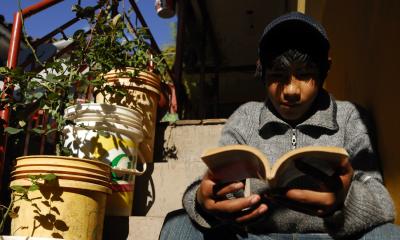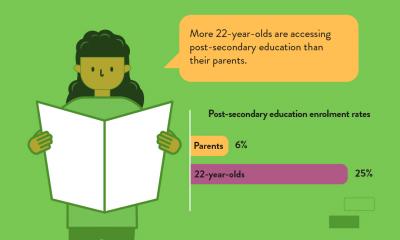
-
Education
Young Lives has tracked enrolment in school of our cohorts over time. Despite a significant increase in school enrolment for both boys and girls, grade progression often remains slow, especially for children from rural sites and poorer households. The study children have high hopes for their education, but their aspirations are being undermined by the poor quality of many schools, which too often works to reinforce existing inequalities. Indeed, global attention is shifting from access to basic education, increasingly posing the question of ‘how much have children learned at school?’. One way that this can be measured is through maths and vocabulary tests which reveal large disparities in learning levels between children from different socioeconomic groups.
Another way in which to explore how children are studying is to look at the number who are over-age for their grade (below the grade that might be expected if they had progressed smoothly through each year/grade at school). Young Lives’ data on education history enable us to analyse how children are progressing through school with over-age for grade seen to be variously the result of late enrolment, grade repetition and other circumstances owing to the pressures on young people in our study countries to work, study and best forge their future pathways.
Young Lives has tracked enrolment in school of our cohorts over time. Despite a significant increase in school enrolment for both boys and girls, grade progression often remains slow, especially for children from rural sites and poorer households. The study children have high hopes for their education, but their aspirations are being undermined by the poor quality of many schools, which too often works to reinforce existing inequalities. Indeed, global attention is shifting from access to basic education, increasingly posing the question of ‘how much have children learned at school?’. One way that this can be measured is through maths and vocabulary tests which reveal large disparities in learning levels between children from different socioeconomic groups.
Another way in which to explore how children are studying is to look at the number who are over-age for their grade (below the grade that might be expected if they had progressed smoothly through each year/grade at school). Young Lives’ data on education history enable us to analyse how children are progressing through school with over-age for grade seen to be variously the result of late enrolment, grade repetition and other circumstances owing to the pressures on young people in our study countries to work, study and best forge their future pathways.



